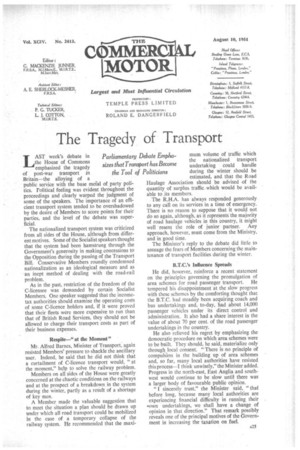The Tragedy , of Transport L AST week's debate in the House
Page 27

If you've noticed an error in this article please click here to report it so we can fix it.
of Commons emphasized the tragedy of post-war transport in Britain—the alloying of a public service with the base mefal of party politics. Political feeling was evident throughout the proceedings and clearly warped the judgment of some of the speakers. The importance of an efficient transport system tended to be overshadowed by the desire of Members to score points for their parties, and the level of the debate was superficial.
The nationalized transport system was criticized from all sides of the House, although from different motives. Some of the Socialist speakers thought that the system had been hamstrung through the Government's generosity in making concessions to the Opposition during the passing of the Transport Bill. Conservative Members roundly condemned nationalization as an ideological measure and as an inept method of dealing with the road-rail problem.
As in the past, restriction of the freedom of the C-licensee was demanded by certain Socialist Members. One speaker suggested that the incometax authorities should examine the operating costs of some C-licence holders and, if it were proved that their fleets were more expensive to run than that of British Road Services, they should not be allowed to charge their transport costs as part of their business expenses.
Respite—" at the Moment"
Mr. Alfred Barnes, Minister of Transport, again resisted Members' pressure to shackle the ancillary user. Indeed, he said that he did not think that a curtailment of C-licence transport would, "at the moment," help to solve the railway problem.
Members on all sides of the House were greatly concerned at the chaotic conditions on the railways and at the prospect of a breakdown in the system during the winter, partly as a result of a shortage of key men.
A Member made the valuable suggestion that to meet the situation a plan should be drawn up under which all road transport could be mobilized in the case of a temporary collapse of the railway system. He recommended that the maxi Parliamentary Debate Emphamum volume of traffic which sizes that Transport has Become undertaking could handle the Tool of Politicians during the winter should be estimated, and that the Road Haulage Association should be advised of the quantity of surplus. traffic which would be available to its members.
The R.H.A. has always responded generously to any call on its services in a time of emergency. There is no reason to suppose that it would not do so again, although, as it represents the majority of road haulage vehicles in this country, it might well resent the role of junior partner. Any approach, however, must come from the Ministry, and in good time.
The Minister's reply to the debate did little to assuage the fears of Members concerning the maintenance of transport facilities during the winter.
B.T.C.'s Influence Spreads He did, however, reinforce a recent statement on the principles governing the promulgation of area schemes for road passenger transport. He tempered his disappointmentat the slow progress with these schemes by the comforting thought that the B.T.C. had steadily been acquiring coach and bus undertakings and, to-day, had about 14,000 passenger vehicles under its direct control and administration. It also had a share interest in the value of about 70 per cent. of the road passenger undertakings in the country.
He also relieved his regret by emphasizing the democratic procedure on which area schemes were to be Wk. They should, he said, materialize only through local consent. "There is no principle of compulsion in the building up of area schemes and, so far, many local authorities have resisted this process—I think unwisely," the Minister added. Progress in the north-east, East Anglia and southwest would continue to be slow until there was a larger body of favourable public opinion.
"I sincerely trust," the Minister said, "that before long, because many local authorities are experiencing financial difficulty in running their • own undertakings, we shall have a change of opinion in that direction." That remark possibly reveals one of the principal motives of the Government in increasing the taxation on fuel.




















































































